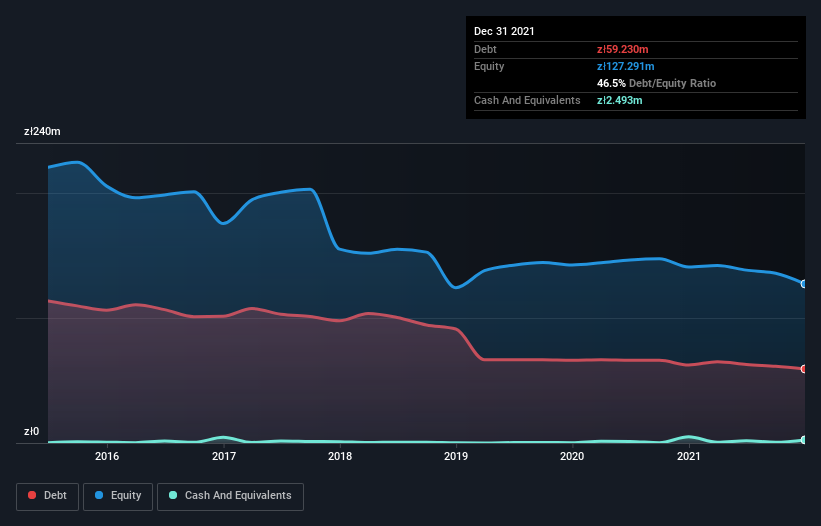Legendary fund manager Li Lu (who Charlie Munger backed) once said, 'The biggest investment risk is not the volatility of prices, but whether you will suffer a permanent loss of capital.' It's only natural to consider a company's balance sheet when you examine how risky it is, since debt is often involved when a business collapses. Importantly, Libet S.A. (WSE:LBT) does carry debt. But should shareholders be worried about its use of debt?
When Is Debt Dangerous?
Generally speaking, debt only becomes a real problem when a company can't easily pay it off, either by raising capital or with its own cash flow. Ultimately, if the company can't fulfill its legal obligations to repay debt, shareholders could walk away with nothing. However, a more frequent (but still costly) occurrence is where a company must issue shares at bargain-basement prices, permanently diluting shareholders, just to shore up its balance sheet. Of course, plenty of companies use debt to fund growth, without any negative consequences. When we think about a company's use of debt, we first look at cash and debt together.
See our latest analysis for Libet
What Is Libet's Net Debt?
You can click the graphic below for the historical numbers, but it shows that Libet had zł59.2m of debt in December 2021, down from zł62.4m, one year before. However, because it has a cash reserve of zł2.49m, its net debt is less, at about zł56.7m.

How Healthy Is Libet's Balance Sheet?
According to the last reported balance sheet, Libet had liabilities of zł159.6m due within 12 months, and liabilities of zł36.8m due beyond 12 months. On the other hand, it had cash of zł2.49m and zł31.2m worth of receivables due within a year. So it has liabilities totalling zł162.8m more than its cash and near-term receivables, combined.
This deficit casts a shadow over the zł65.0m company, like a colossus towering over mere mortals. So we definitely think shareholders need to watch this one closely. At the end of the day, Libet would probably need a major re-capitalization if its creditors were to demand repayment. There's no doubt that we learn most about debt from the balance sheet. But you can't view debt in total isolation; since Libet will need earnings to service that debt. So if you're keen to discover more about its earnings, it might be worth checking out this graph of its long term earnings trend.
In the last year Libet wasn't profitable at an EBIT level, but managed to grow its revenue by 14%, to zł284m. We usually like to see faster growth from unprofitable companies, but each to their own.
Caveat Emptor
Importantly, Libet had an earnings before interest and tax (EBIT) loss over the last year. Indeed, it lost a very considerable zł10m at the EBIT level. Combining this information with the significant liabilities we already touched on makes us very hesitant about this stock, to say the least. Of course, it may be able to improve its situation with a bit of luck and good execution. Nevertheless, we would not bet on it given that it lost zł13m in just last twelve months, and it doesn't have much by way of liquid assets. So we think this stock is quite risky. We'd prefer to pass. When analysing debt levels, the balance sheet is the obvious place to start. However, not all investment risk resides within the balance sheet - far from it. We've identified 1 warning sign with Libet , and understanding them should be part of your investment process.
Of course, if you're the type of investor who prefers buying stocks without the burden of debt, then don't hesitate to discover our exclusive list of net cash growth stocks, today.
New: AI Stock Screener & Alerts
Our new AI Stock Screener scans the market every day to uncover opportunities.
• Dividend Powerhouses (3%+ Yield)
• Undervalued Small Caps with Insider Buying
• High growth Tech and AI Companies
Or build your own from over 50 metrics.
Have feedback on this article? Concerned about the content? Get in touch with us directly. Alternatively, email editorial-team (at) simplywallst.com.
This article by Simply Wall St is general in nature. We provide commentary based on historical data and analyst forecasts only using an unbiased methodology and our articles are not intended to be financial advice. It does not constitute a recommendation to buy or sell any stock, and does not take account of your objectives, or your financial situation. We aim to bring you long-term focused analysis driven by fundamental data. Note that our analysis may not factor in the latest price-sensitive company announcements or qualitative material. Simply Wall St has no position in any stocks mentioned.
About WSE:LBT
Flawless balance sheet with low risk.
Market Insights
Community Narratives



